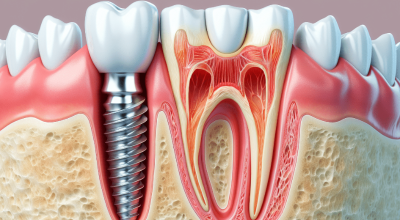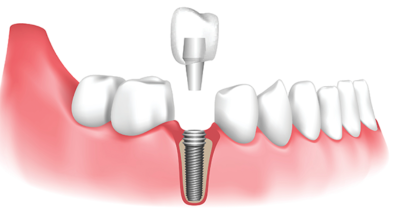Why do dentists recommend dental implants?
Dental implants (also known as dental implants or implants) are a type of dental treatment used to replace missing teeth. It involves implanting an artificial tooth root (usually made of titanium metal) into the mandible or maxilla, and then attaching a denture crown to this artificial tooth root.
These are the benefits of dental implants you need to know
- Natural look and feel
Especially from the functional point of view, whether it is the absence of a single tooth or the entire tooth, the current implant materials and technologies can provide patients with a perfect appearance and comfort, the appearance of implant teeth designed to imitate natural teeth, through the use of high-quality materials and fine production process, implant teeth can achieve almost the same aesthetic effect as natural teeth.
Currently the most commonly used crown material is zirconia because of its good biocompatibility and translucent appearance as well as excellent strength. The color, shape and size of the implant can be customized according to the needs of the patient, so that it blends perfectly with the surrounding natural teeth to achieve a natural and beautiful effect.
Dental implants function through a biological process called osseointegration, in which the implant fuses with the jaw to provide stable support. This allows the implants to withstand bite forces and pressures similar to those of natural teeth. The bite force of implanted teeth can reach 38-45 kg, almost as much as that of natural teeth, which allows patients to eat a variety of foods normally without discomfort or inconvenience. Osstem implants are one of the world's leading dental implant systems, designed and functioning very similar to natural teeth, using advanced materials and technologies to provide good biocompatibility and stability, helping patients to restore a beautiful smile and normal oral function, so that they can smile, eat and participate in social activities without worry.
- Improve chewing and speech

Implants can restore patients' full chewing ability, enabling them to eat their favorite foods without discomfort. The implants provide stable support through a tight attachment to the alveolar bone, restoring chewing function to more than 95%, meaning that patients can chew a variety of foods, including hard or chewy foods such as apples and nuts, with the same ease as using natural teeth.
In addition, dental implants prevent slurred speech or mumbling that can occur with dentures, thereby improving speech clarity. Because the implants are fixed to the jaw, they do not move through the mouth as movable dentures do, which allows patients to speak with more confidence and clarity.
- Prevent bone loss
Dental implants can stimulate the jaw and prevent the bone loss that usually occurs with missing teeth. This helps maintain the natural structure of the face and jaw.
First, the implant is designed and made of materials that allow it to be tightly attached to the jaw, a process called osseointegration. In this way, the implant transmits mechanical stress during chewing and occlusion, similar to the function of natural teeth, thus stimulating the growth and remodeling of the jaw bone.
In addition, the presence of dental implants can effectively prevent the atrophy of the alveolar bone. After tooth loss, the alveolar bone in the missing part is prone to bone loss and atrophy due to lack of mechanical stimulation.
- Protection of adjacent teeth
Unlike Bridges, dental implants do not require changes to the adjacent teeth, which can protect the health and integrity of the surrounding teeth. There are two dimensions to this:
First, there is no need to grind the adjacent teeth, there is no need for the adjacent teeth to make sacrifices in order to install the fixed bridge, and no grinding will avoid tooth sensitivity, tooth nerve infection and even the need for root canal treatment due to the grinding of too much tooth tissue.
The second is that there is no need for good teeth on both sides of the "two people do three people's work", the commonly used fixed bridge mode is two with one, and the good teeth on both sides are used to bridge and repair the missing teeth in the middle, which seems to be three teeth, but the actual bottom has only two roots. Although our calculations and years of experience have shown that this burden is acceptable when the teeth on both sides are strong enough, it is still tiring to the teeth on both sides. There are also many patients for this repair method of feedback is afraid to force.
- Improve oral health
Dental implants don't have as many bacterial gaps as removable dentures, and the presence of these bacteria can cause a specific oral disease called "denture stomatitis." The longer the denture is worn, the greater the incidence of the disease, the oral mucosa covered by the denture will be red, swollen and uncomfortable, and if the denture is not stopped, it is difficult to heal, and the elderly with weak resistance are often accompanied by fungal infection, which is even more difficult. Moreover, these inflammations and the compression of the mucosa by the denture all promote the further absorption of the alveolar bone, affect the stability of the denture, and increase the difficulty of re-denture in the future.
I don't need to say that the impact of movable dentures on the rest of the teeth, many patients themselves have the feeling "my teeth are dentures to hook bad!" Let me also clarify a little here, in fact, most dental decay is not directly caused by movable dentures, but it is also because of the presence of dentures, which makes those locations more prone to plaque accumulation and more difficult to clean thoroughly, resulting in a high incidence of dental caries. Dental implants do not have these problems, as long as you brush and floss every day like natural teeth, you can keep your mouth clean and healthy for a long time.
In conclusion, these are the many advantages of dental implants, which have become the preferred option for modern oral restoration. Choosing dental implants is not only to restore chewing function, but also to improve the quality of life and enjoy a healthy and confident smile.

